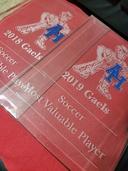Brandon Monegro '19 Recruiting Profile

Video
Personal Statement
Carmelo Anthony. Michael Jordan. Mark Buehrle. Lionel Messi. Brandon Monegro.
What do all these athleteshave in common? We have all been rejected from our respective teams.With shaking hands, I opened the letter addressed to me. I opened it slowly, and there it was in black and white. Iwas rejected from the high school soccer team. I was devastated, hurt and embarrassed.Looking back on that letter, I realize that I could have recognized the difficulty of trying out for the high schoolsoccer team and worked harder. Up until then, I had taken for granted that I would always play soccer andassumed that I was good at it. This rejection was a dagger to my heart. My coaches telling me that my staminawas the biggest reason holding me back inspired me to earn a spot on the track and field team. Even thoughrunning after school almost every day improved my endurance, my stamina was still my weakness. I had to figureout other ways to improve my performance. I wanted to further comprehend the rules and get another perspectiveon the game. I took a class to become a referee to learn all the rules and to enhance my vision on the field. Takingthis class helped improve my skills and showed me how to position myself and what I could and could not doduring a game.I joined a higher ranked HBC Division 1 team where we had a professional trainer as our coach; here, I was nolonger the star of the team. There were kids that were good, really good; I had to work hard to keep up. This coachdid not hold back his words and if you did well he told you, but if you did not, he called you out on it. In thebeginning, I was frustrated. I was not able to easily beat my new teammates and it was a struggle every time Iwent to practice. Then I started to understand that what was being asked of me was making me a better player. Iwas more confident playing the game.As I got better, I wanted to help my team improve as well. I would go to the park with some of my teammates topractice until we perfected the drills. We would work on footwork, finessing, and power shooting. I would showthem what part of their foot they should use for each shot and how they should position themselves. Myteammates trusted that I knew how to help and coach them. We were now a family and I had a new respect andlove for the game.If I had made the school team, I would not have learned any of the lessons I took away from this. I needed to feelthis pain to learn that I was not there yet. It made me dig deep and find the courage to get up, dust myself off, andwork harder to achieve my dreams. This is true for any aspect of my life, I have realized, whether it’s with a badtest grade, not making a team, or something as simple as playing video games. This failure humbled me andopened my eyes. “Disappointment is the nurse of wisdom.” I will never take anything I love for granted again.“
There may be people that have more talent than you, but there’s no excuse for anyone to work harder than you”
~Derek Jeter. Words that I now live by!
Athletics
High School Information
- 2019 Club/Travel Team
- Starter- Jersey: #48
- 2018 Club/Travel Team
- Starter- Jersey: #48
Club Information
- Seasons of Club Experience
- 1 season
- 2017 South Huntington Lightning (Division 2)
Coach References
- Other
- Alex Mendolia
Training
- College Coach at St Joseph
- 6 years
Additional Sports
- Track
- 3 years
- Sophomore Team
Statistics
Academics
Grades
Test Scores
Academic Accomplishments
Are you in honor classes?
Yes. English, CalculusAre you in AP/IB classes?
Yes. SpanishRegistered with the NCAA Eligibility Center?
NoAwards and Activities
- AwardsHonor Roll since 9th Grade STEM Award Recipient SUNY Farmingdale
- ActivitiesSTEM Program since 6th Grade Activity type-Computer/Technology Position/Leadership description-NYIT IDEAS/Gaming Industry Experimental Learning-Programmed and coded robot to perform specific tasks. Participation grade levels-9 Timing of participation-During school break Hours spent per week-6 Weeks spent per year-6 Activity type Community Service (Volunteer) -Helping Hands Rescue Mission Please describe this activity-Helped set up fundraiser sales, find, tag and organize clothing/ other essentials for the poor, fed the hungry during soup kitchen Participation grade levels-9, 10, 11 Timing of participation-All year Hours spent per week-3 Weeks spent per year-7
Top NCSA Athletes at Walt Whitman High School




Top NCSA Athletes in Area




